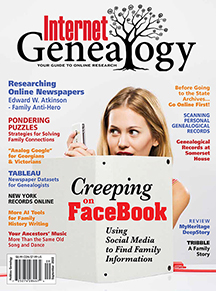 Here are the contents of the latest issue, due on newsstands on 19 August.
Here are the contents of the latest issue, due on newsstands on 19 August.
Creeping on Facebook
Robb Gorr looks at using social media to find family information
Tableau
Diane L. Richard looks at newspaper datasets relevant to genealogists
More than the Same Old Song and Dance
Sue Lisk explores websites to help you understand the music of your ancestors
“Analog Google” for the Georgians & Victorians
David A. Norris looks at reference books for home and business
Edward Waugh Atkinson – A Family Anti-Hero
Adam Winstanley looks at online newspapers to enhance family stories
Researching State Archives? Stop! Go Online First
Karen L. Newman says go online before going to the State Archives. A featured look at West Virginia, Kentucky, and Ohio
AI Tools for Family History Writers
Lisa Alzo looks at AI Tools for family history writers
Scanning Personal Genealogical Records
Ed Storey suggests using simple thumb drives to store your valuable family history data
What They Threw Away
Constance Cherba with Sam and Joe Ashkar examine what our ancestors threw away
Pondering Puzzles
Sue Lisk suggests ways to solve your own family history puzzles
REVIEW: DeepStory
Lisa A. Alzo reviews a new animated storytelling tool from MyHeritage
Genealogical Records at Somerset House
David A. Norris looks at 133 years of the records held at Somerset House in the UK
New York Historical Vital Records Online
Joe Grandinetti looks at finding the Big Apple on the family tree
Tribble: A Family Story
By Donna Potter Phillips
NetNotes
Internet Genealogy looks at websites and related news that are sure to be of interest
Photos and Genealogy
Do you remember the times of your life?
Research Questions from the Genealogy Center
More on Exploring PERSI at the Genealogy Center
Back Page:
Dave Obee suggests sensitivity should be the watchword when asking questions about family history.
Click an underlined heading at https://www.internet-genealogy.com/issue_contents.htm to preview the first page of multi-page articles.


I will certainly be interested to read about how “simple thumb drives” are the best option to store valuable family history data…given how often they go bad. Any IT person will tell you that they are good only for transferring files, not permanently storing them.